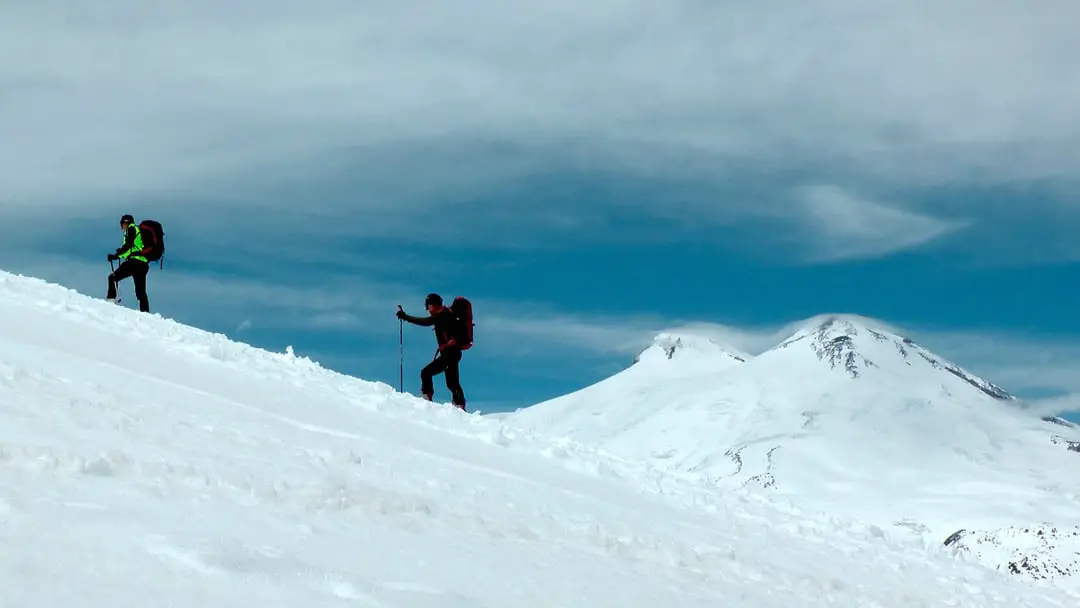In this text, Tajik blogger Roxana Burkhanova describes, in Russian, the tradition of taking extreme camping trips in Russia and other countries of the former USSR. The text was originally writen in 2015 and thus references times when, for instance, travel between Russia and Ukraine was common place. Today this is no longer the case, of course, and, in fact, travel outside of Russia for Russians is more difficult in general due to sanctions.
The resource below is part of a larger series of intermediate Russian lessons known as Моя Россия, in which Roxana explores minority populations in Russia as well as economic and demographic issues there. Моя Россия builds upon Olga’s Blog, another set of intermediate Russian lessons that give shorter texts that focus more on daily life and cultural issues. All of these lessons have been sponsored by SRAS, an organization that encourages the study of Eurasia from abroad through free resources and offers study abroad programs in Eurasia.
We will start with a brief synopsis in English before presenting the Russian text. As the Russian text is somewhat dated, we have also provided a small update in English to the information presented there. All boldface words are vocabulary words that are defined and discussed below. Red words and phrases are part of the grammar lesson included below that. Asterisks indicate slang or jargon.
Russian Tourism and Extreme Camping: Synopsis and Update in English
The USSR left most consumer industries severely under developed – including tourism infrastructure. When Soviet citizens went on vacation, they were generally expected to go to a “rest house” (дом отдыха) or sanatorium, for instance. These were centralized “resorts” and were often arranged as part of their compensation packages at their place of employment. Especially as travel outside the country was restricted, if one wanted to privately vacation, this often meant going to one’s own dacha outside the city or going camping.
Camping and countryside excursions are still popular in Russia. These might be simple day trips or extensive expeditions that last 2-3 weeks. Getting there might involve a ride on a suburban electric train, travelling by SUV, or, for the truly serious camper, hiring a company to take you into the countryside using military surplus vehicles built for traversing some of Russia’s toughest terrain.
Today, these are only gaining in popularity. Domestic tourism has gotten a major boost since sanctions have rendered most Russians’ bank cards useless outside of Russia. Although the Russian state has been promoting and, in places, funding tourism development including in the North Caucasus, Altai Mountains, the Russian North, the Black Sea coast, and, after 2014, heavily investing in former Soviet resorts in Crimea, Russian tourism infrastructure in many ways still lags behind what Russians had gotten used to when traveling abroad.
The sector is also facing difficulties due to inflation, logistical challenges, and reduced investments, impacting the affordability and accessibility of domestic travel for Russians. That said, camping doesn’t remain popular just for negative reasons. It’s also considered healthy – a way to reconnect with nature, gain physical exercise, and commune with others.
It’s also not just popular in Russia. The development of the Transcaucasia Trail and a “yurt-to-yurt hiking network” show that investments are flowing into extreme tourism infrastructure. In the articles written by SRAS graduate (and current SRAS Outreach Coordinator) Alexandra Koteva about hiking across Georgia, Armenia and Azerbaijan that the locals she meets along the way seem to think nothing of her extreme hiking. Connecting with and returning to nature is in many ways a way of life in much of Eurasia.
Активный отдых на природе
Россияне, как и все остальные люди на планете, любят расслабляться. Отдыхать любят по-разному: кому-то нравится лежать на диване и смотреть телевизор, кто-то любит поехать на море на неделю-другую, а кто-то мечтает о том, чтобы уехать в глушь с одним лишь рюкзаком за спиной.
Самый простой способ принять участие в активном виде отдыха – это поехать за город. Если вы живете в Москве, то у вас есть возможность исследовать окрестности города. Московская область очень богата своей историей и разнообразной природой. Достаточно сесть на электричку и поехать, например, во Фрязино, где можно погулять по лесу, вечером разбить палаточный лагерь, собраться у костра, пожарить шашлыки, а на утро пойти посмотреть на руины усадьбы Гребнево.
Походы и активный отдых за городом
Если вам хочется чего-то более экстремального, можно организовать полноценный поход по любому маршруту. В таком случае направление и сложность зависят только от вашего желания и возможностей. Можно не уходить далеко, а можно уехать на другой конец России или вовсе за границу. У меня есть друзья и знакомые, которые постоянно куда-то ездят и ходят в походы. Где они только не были! И на Русском Севере (северные регионы Европейской части России), и на Алтае, и в Карелии, и на Сахалине. Есть многие другие популярные места, часто посещаемые русскими туристами, которые находятся за пределами России. Чаще всего это горные районы бывших республик СССР: Крым и Карпаты, Киргизия, Таджикистан. Я же ходила в поход всего два раза несколько лет назад: в Крым и в Турцию (не считая того раза, когда мне было три года и мы с мамой и ее друзьями жили в палатке на берегу моря в Крыму пару недель).
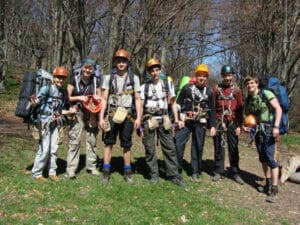
Походы организовываются турклубами, членами которых являются некоторые походники* – тогда из простого развлечения поход превращается скорее в вид спорта со своими особыми правилами. Если же идущая в поход группа не состоит ни в каком клубе и для ее членов поход – это просто любимое дело, то они и сами могут все организовать. В среднем ходят 3 недели, а если хочется чего-то полегче, то можно рассчитать маршрут на 1-2 недели. Количество людей в группе может быть абсолютно разным, от нескольких человек, до нескольких десятков человек – смотря сколько друзей вам удастся собрать! Большие походы – это дело серьезное. Они требуют хорошей и тщательной организации и подготовки. Ведь чем дальше от цивилизации ты уходишь, тем опаснее оказаться в ситуации, когда у тебя нет чего-то очень нужного, потому что ты просто забыл это дома. Так что к походам начинают готовится обычно за несколько месяцев.
Подготовка к походам и выбор маршрутов
Маршруты тоже тщательно просчитываются: каждый перевал и место для ночлега, каждый поворот и отрезок пути должны быть заранее изучены, должна быть собрана самая новейшая информация. От этого зависит не только легкость или сложность маршрута, но и безопасность людей в группе. Заброска* на начало маршрута и выброска* после его прохождения происходят по-разному (в зависимости от местности). Например, в сибирской тайге туристов могут забрасывать армейскими вездеходами, когда как на Камчатке для этого чаще всего используются вертолеты. Заброска и выброска могут стоит очень дорого.
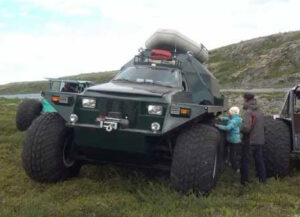
Если вы не большой любитель прогулок на природе, то не беда! Есть много других активных развлечений. Одно из моих самых любимых – городское ориентирование. Это соревнование, в котором каждая команда пытается самой первой пройти городской маршрут. Чтобы узнать маршрут, необходимо разгадать загадки и увидеть подсказки. Выигрывает тот, кто все разгадал и пришел к финишу первым. Такие соревнования проводятся во многих городах: и в Москве, и в Санкт-Петербурге, и в Екатеринбурге. Я даже ездила в Хельсинки, в Киев и в Брест, чтобы участвовать в соревнованиях там. Ведь это лучший способ не только увидеть целый город за один день, но и посоревноваться в скорости и смекалке!
Городское ориентирование и другие активные развлечения
Активным отдыхом увлекаются не только молодые спортивные люди. Да, для длительных горных походов важна хорошая физическая подготовка, но очень часто среди походников-любителей можно увидеть и стариков, и детей. Иногда в походы ходят целыми семьями! Так же дело обстоит и с городским ориентированием, в котором участвуют люди всех возрастов. Нельзя сказать, что активный отдых чрезвычайно популярен среди россиян, но лично я знаю очень многих, интересующихся этим. К тому же Россия – это страна богатая своей историей и природой, что создает огромное число возможностей для подобного времяпрепровождения!
Vocabulary and Cultural Annotations
Неделя-другая (or день-другой/минута-другая/час-другой и т.д.) one or two weeks, several weeks. This translates literally as “a week and another,” and describes an indefinite period lasting longer than the specific unit of time mentioned.
Ex.: Мы поживем там месяц-другой.
Глушь – wilderness.
Активный отдых – outdoor activities; active leisure.
Окрестность – neighborhood, environs, surroundings;
Окрестности города – territories adjacent the city/town that surround it.
Электричка – a commuter electric train. These connect Russia’s major cities with the surrounding suburban areas and often stretch to villages a considerable distance from the city, providing relatively cheap transport to urban centers.
Разбивать палаточный лагерь – make camp. “Палаточный” is an adj. from the noun “палатка” – tent.
Шашлыки – shashlik; is a form of shish kebab popular in the Caucasus, Central and Western Asia and Eastern Europe.
Усадьба – manor, country estate.
Поход – hike.
Маршрут – route.
Поехать за границу – to go abroad, to leave the country; заграница – in case it’s a noun it’s written in one word, means abroad, foreign countries; заграничный – adj., something that is not in the country, something that is in foreign country.
Горные районы – mountain regions.
Турклуб – tourist club.
Походник* – hiker, tourist. Slang from the word “поход”.
В среднем – on average.
Тщательный – careful, thorough.
Просчитывать (in this case the meaning is like in рассчитывать) – to calculate, to estimate.
Перевал – mountain pass.
Заброска* – the process of bringing a group to a starting point of the hike route;
Выброска* – the process of collecting a group from the finishing point of the route.
Тайга – taiga.
Армейский – military, adj.
Вездеход – cross-country vehicle.
Вертолет – helicopter.
Любитель – a person who likes to do something, for example as a hobby; amateur.
Профессионал – professional, opposite of любитель.
Городское ориентирование – competition in navigation in cities/towns.
Разгадать загадку – to solve a riddle.
Смекалка – sharpness, keenness of wit.
Физическая подготовка – physical shape; хорошая физическая подготовка – good/healthy physical shape.
Многие – plural; many, a big amount of something; in this case is used instead of a noun so instead of saying многие люди or repeating многие россияне you can just say just многие.
Я знаю многих, интересующихся этим… – it’s clear that I talk about people I know who are interested in outdoor activities. I used the verb знаю, so it’s clear that the missing noun here is знакомые (acquaintances) – I said “я знаю многих” instead of saying “я знаю многих знакомых” to avoid repetition. I was able to do it because it was already clear that I’m talking about people I know.
Grammar Focus
Commas between Complex Sentences
I. Simple and complex sentences
Simple sentences in Russian are sentences with one main clause (usually a subject and a predicate, sometimes subject only, in rare cases predicate only)
Ex.: Дождь идет с самого утра. / Ночь. Улица. Фонарь. Аптека. / Смеркается.
Complex sentences in Russian are all sentences that are not simple. These sentences consist of two or more simple sentences connected by meaning and intonation. Simple sentences within the complex sentence can be connected by the conjunction “и” and separated by commas.
Ex.: Гости вернулись с прогулки, и мы их встретили у дверей.
This sentence consists of two clauses. Schematically, it can be rendered as:
[1], и [2]
- Attention! Do not mistake “и” between simple sentences in a complex sentence for “и” between similar members of a sentence (which do not function as a simple sentence themselves). For more on members of sentence, see our previous lesson.
- Two similar members of a sentence will not have a comma placed between them: @ и @
- If it’s a complex sentence, then in most cases you have to put comma between them: [1], и [2]
Ex.: @ и @
Гости ходили в лес и на реку.
Гости и хозяева пошли в лес.
Они ходили в лес и ездили на реку.
Ex.: [1], и [2]
Гости ходили в лес, и хозяева пошли с ними.
Они ездили на реку, и мы тоже поехали туда.
II. Complex and compound sentences.
Compound sentences consist of two or more simple sentences that are connected by a coordinating conjunction (eg: и, а, да, но, зато, однако, однако же, все же) and are independent clauses. Clauses in a compound sentence are usually separated by comma.
Ex.:
[Сверкнула молния], [и послышался гром].
[То туман все заволакивал], [то начинал идти дождь].
[Горы обступали озеро], [но склоны их были не круты].
Complex sentences are not just a general term for the sentences that are not simple. Complex sentences are sentences with at least one independent and at least one dependent clause that are connected by a subordinating conjunction (что, оттого что, так как, чтобы, для того чтобы, когда, только, пока, если, ли, как, будто, несмотря на то что, хотя etc.). You can ask a simple question (eg. о чём? когда?) from the independent clause (schematically marked as “[ ]”)to a dependent one (schematically marked as “( )”) – this way you can recognize the type of subordinate connection between them.
Ex.:
[Он подумал о том], (что скоро пойдет снег).
→ о чём?
(Когда рассвело), [запели птицы].
когда? ←
→ в каком?
III. No comma is used in compound and complex-compound sentences with the conjunction “и.”
Usually in compound sentences, when there’s “и” you have to separate clauses with a comma. But in some cases it is different.
1. There is no comma between the sentences/clauses if there is common secondary member of a sentence (meaning NEITHER a subject nor an object):
Ex.: { Сейчас } [брызнет майский дождь] [и начнется гроза].
2. There is no comma if there is a common dependent clause.
Ex.: { (Когда совсем рассвело) }, [нас разбудили] [и мы отправились в путь].
когда? ← — ←
3. There is no comma if at least two dependent clauses have a common independent clause they are dependent on. They act like similar members of a sentence – they have to answer to the same question. The subordinating conjunction can be repeated in each one of the dependent clauses.
Ex.: { [Мы подумали] }, (что он опоздает) и (что мы не сможем попрощаться с ним).
→ что? → что?
{ [Мы подумали] }, (что он опоздает) и (мы не сможем попрощаться с ним).
→ что? → что?
Note that the main clause is separated with a comma and there is no comma neither before nor after “и” nor before the subordinating conjunction “что.”
Ex.:
{ [Слышно было] }, (как гудели машины), (как позванивали трамваи) и (как разговаривали люди).
→ что? → что? → что?
{ [Слышно было] }, (как гудели машины), (как позванивали трамваи) и (разговаривали люди).
→ что? → что? → и что?
- Note that between the first and the second dependent clause there is no “и,” so there is a comma. But between the second and the third dependent clause there is an “и” so there is no comma.
- Note as well that in the third dependent clause in the first version of the sentence, a subordinating conjunction is repeated. But in the second version of the sentence there is no subordinating clause repeated.
4. Also there are some rare cases where there is no comma before “и:”
– If a compound sentence consists of two nominative sentences, it is connected by “и.”
A nominative sentence is a sentence that consists of only a subject with no predicate. A subject in such a sentence is usually a noun in the nominative case or a phrase with a noun in the nominative case.
Ex.: [Предрассветные сумерки] и [звуки просыпающейся природы].
– If a compound sentence consists of two impersonal sentences connected by “и”.
Impersonal sentence is a sentence with only predicate (often complex).
Ex.: [С крыш капало] и [в окна веяло свежестью].
– If a compound sentence consists of two hortatory, interrogative, or exclamatory sentences.
Ex.: [Где мы встретимся] и [как я вас узнаю?]
- Note that this sentence can be divided into two sentences – two questions: Где мы встретимся? Как я вас узнаю?
Examples from Literature
Кто говорил с ней и видел при каждом слове ее светлую улыбочку и блестящие белые зубы, которые виднелись беспрестанно, тот думал, что он особенно нынче любезен. (Л. Н. Толстой «Война и мир»)
В первой много места занимал широкий турецкий диван, стояло дорогое пианино, на котором она все разучивала медленное, сомнамбулически прекрасное начало «Лунной сонаты»… (И. А. Бунин «Чистый понедельник»)
Маргарита пошла вниз и, приземлившись, увидела, что фасад дома выложен черным мрамором, что двери широкие, что за стеклом их виднеется фуражка с золотым галуном и пуговицы швейцара и что над дверьми золотом выведена надпись: «Дом Драмлита». (М. А. Булгаков «Мастер и Маргарита»)
You’ll Also Love
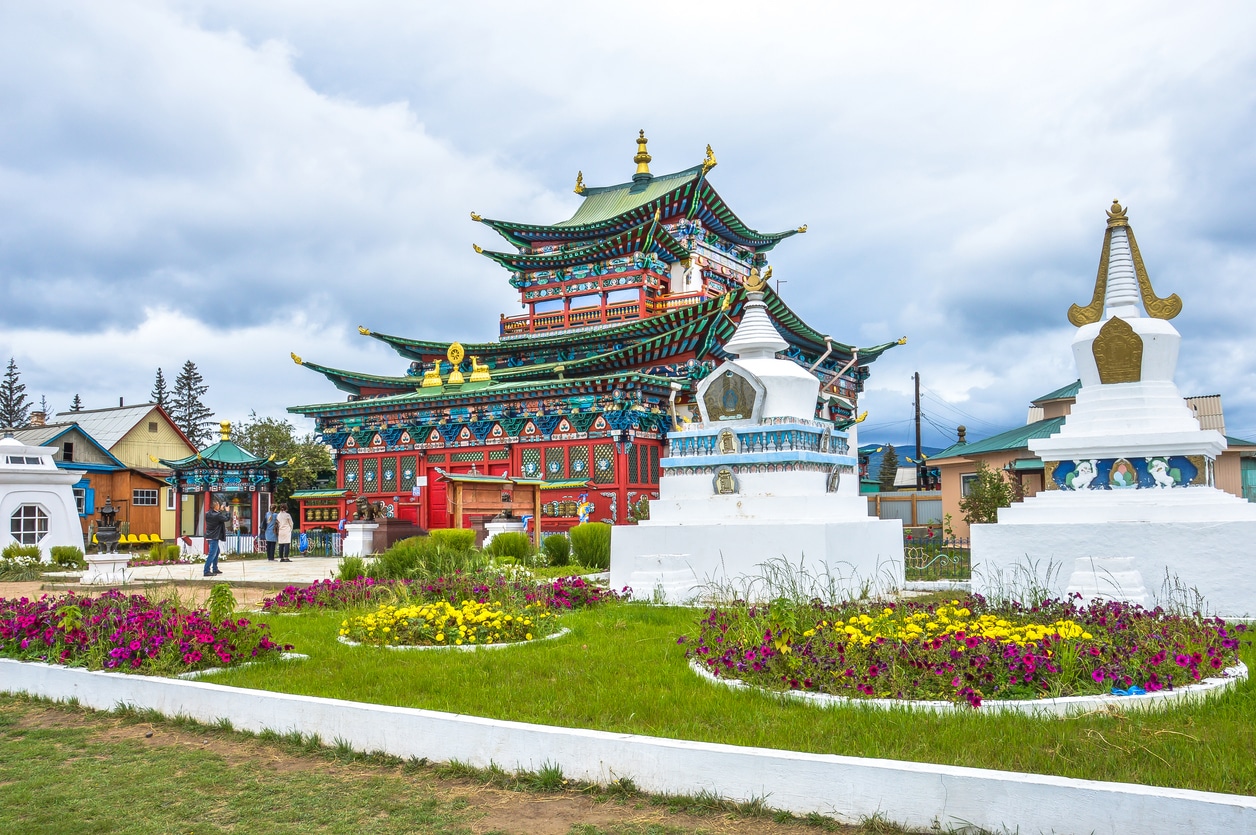
The Surprising Story of Russian Buddhism: Моя Россия Blog
In this text, Tajik blogger Roxana Burkhanova describes, in Russian, the history and current status of Buddhism in Russia. Buddhism is a small but historically important minority faith in Russia, especially in the Southern regions of Tuva, Buryatia, and Kalmykia. The material below details both the challenges that Buddhists have faced in integrating to wider […]

Russian MiniLesson: Russian Grammar Terms and Related Russian Vocabulary
Russia’s is different from what is typically found in the USA. While occur in both Russia and America, it is much more common for Russian teachers to be and perhaps . Wrong Example: Right Example: may make seemingly sarcastic remarks regarding a student’s performance, for example. Writer Anton Chekhov described this in his 19th century […]
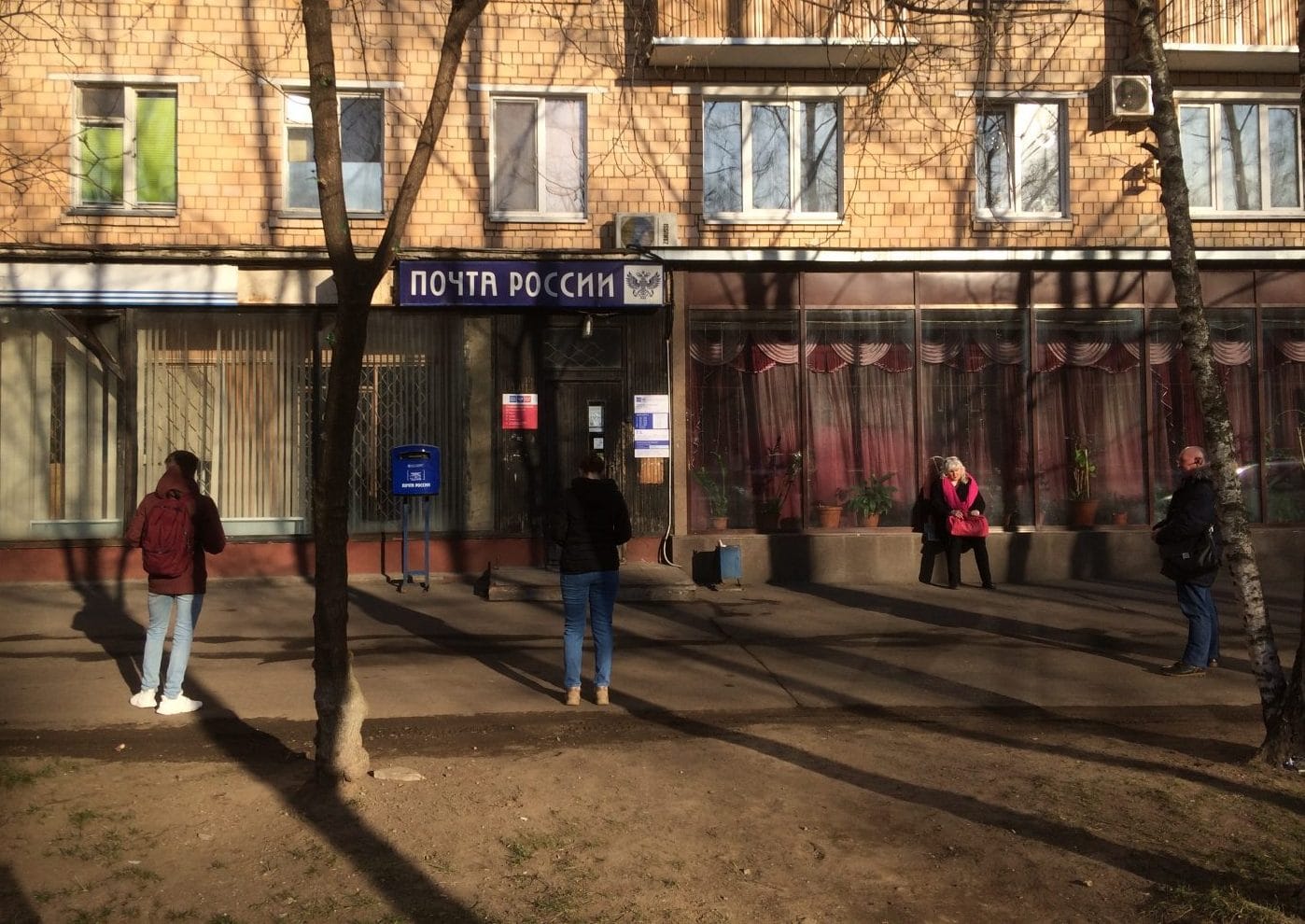
Quarantine Diaries: Настроение и принятые меры
Quarantine Diaries is a series of free language lessons. Each can take a variety of forms but all focus on building intermediate and advanced vocabulary and listening skills. The following bilingual text was created from a blog entry by SRAS Assistant Director Josh Wilson on SRAS.org. It has been reformatted here as a Russian MiniLesson. […]
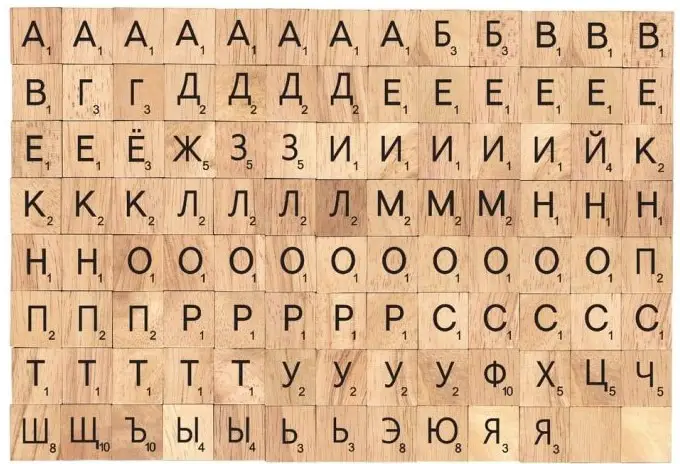
Resources for Students of Russian
This extensive list of web resources to assist students learning the Russian language was developed by SRAS and is now hosted on Folkways, part of the SRAS Family of Sites! Disclosure: Some of the links below are affiliate links. This means that, at zero cost to you, we will earn an affiliate commission if you […]

Translation Challenges in Russian
Translating between any two languages can be difficult, and translating between Russian and English is no exception. Due to certain grammatical differences, some meanings within the languages can be difficult to translate. While such differences between English and Russian that affect accurate translation are numerous, below are six of the most interesting in our opinion. […]

